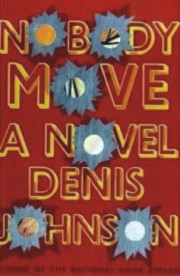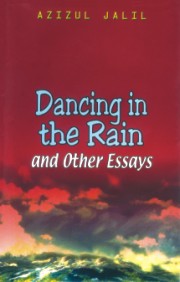|
Book Review
Nobody Move
Jacob Molyneux
 “Nobody Move" - first published in serial form in Playboy magazine and now packaged as a trim ironic novelty item, the garish red-and-yellow cover riddled with comic-book depictions of bullet holes - is a lean, addictively suspenseful crime novel by Denis Johnson, the poet, playwright, novelist and occasional journalist who won the National Book Award in 2007 for his sprawling, ambitious Vietnam War novel, "Tree of Smoke." “Nobody Move" - first published in serial form in Playboy magazine and now packaged as a trim ironic novelty item, the garish red-and-yellow cover riddled with comic-book depictions of bullet holes - is a lean, addictively suspenseful crime novel by Denis Johnson, the poet, playwright, novelist and occasional journalist who won the National Book Award in 2007 for his sprawling, ambitious Vietnam War novel, "Tree of Smoke."
Eschewing the milder, more reflective emotional range of most literary fiction, this expertly titrated entertainment delivers a steadily pleasurable dose of voyeuristic dread.
Johnson writes pulp fiction with alarming ease and economy, crisply working the old noir character types through a relentless series of reversals, milking them at the most dire moments for unlikely, enigmatic utterances that are quickly forgotten as we turn the page and hurry on:
Will the likable improviser and chronic gambler Jimmy Luntz really get his testicles eaten by the vicious loan sharks?
Will the gorgeous, quasi-mystical, alcoholic American Indian Anita DeSilvera get even with her husband the county prosecutor, who framed her and left her homeless and destitute?
Can Johnson pull off 190 stylised pages of taut dialogue, sex and violence among the tract houses and motels of California's Central Valley without a single glimpse of life as it is actually lived in such places? (Or is this how life is actually lived near ground zero of the mortgage gold rush?)
And who, if not George Clooney, will be cast to play the opening scene - in which Luntz sings in a barbershop chorus while wearing a white tuxedo - with just the right insouciance?
The lowlife drifters, opportunists and criminals in "Nobody Move" are a lot like the characters in Johnson's influential 1993 collection of short stories, "Jesus' Son." The big difference is that there's no trippy, retrospective first-person voice in "Nobody Move," no seer druggie "I" to elevate each violent, strange encounter to a poetic and metaphysical level.
Put another way, the drug being sold here is mostly uncut by the romanticism that made those earlier stories so seductive to a generation of MFA workshop students eager for a transgressive sensibility to imitate.
The tone is deadpan, cool, elliptical. Only on rare occasions do Johnson's descriptions veer into the expressionistic: "After the film it was raining, a light, steady rain. Ruthless neon on the wet streets like busted candy." And once or twice people say things like, "Not every day comes out symmetrical, Babylove." Or this: "You're meaner than I thought. And deeper down."
The chain-smoking anti-hero, Luntz, doesn't drink or use drugs, but he plays every moment like a scratch ticket, believes against all evidence in his own luck and has a sage's ability to find peace at the worst moments: "Early in his teens Luntz had fought Golden Gloves. ... His secret was that he'd never, before or since, felt so comfortable or so at home as when lying on his back and listening to the far-off music of the referee's ten-count."
Anita DeSilvera has her own more troubling brand of masochism, and together Luntz and DeSilvera are so incautious about their own fates that we can't help pulling for them as their situation goes from bad to worse. But Johnson was wise to keep "Nobody Move" short. As in much genre fiction, the characters lack the depth to support a credible backstory, sustained interiority or the press of the ordinary.
As a fiction writer, Johnson tends to be most beguiling when he works in small, breakneck units and leaves the bigger plan to luck or fate. The best sections of Johnson's widely celebrated "Tree of Smoke" - the parts that kept us reading even if we stopped believing in the plot or the self-conscious thematic mashup of "Moby-Dick," "Apocalypse Now" and "The Quiet American" - were those that were most suspenseful and kinetic, driven by the kind of quick, slippery dialogue and surrealist stop-time action that animates "Nobody Move."
Johnson has a powerful gift for keeping readers just enough off balance, and it can be seen on sharp display in this taut novel billed as a mere bauble from a talented American author at play.
This review first appeared in The San Francisco Chronicle.
Raindancing
Andrew Eagle
 In the gaps of a busy afternoon my latest companion, 'Dancing in the Rain and Other Essays' by Azizul Jalil, brings a world of ideas and experiences to me, in my living room. The beauty of the book is the wide range of topics, divided into four parts entitled Reflections, Travels and Impressions, Reminiscences and Glimpses of the Past. The first three sections offer concise memoir / personal essay and biography-style prose, while the last section is composed of historical material covering specific moments of interest, including the last days of Adolph Hitler, Napoleon's life in exile on St Helena and the death of Alexander the Great. In the gaps of a busy afternoon my latest companion, 'Dancing in the Rain and Other Essays' by Azizul Jalil, brings a world of ideas and experiences to me, in my living room. The beauty of the book is the wide range of topics, divided into four parts entitled Reflections, Travels and Impressions, Reminiscences and Glimpses of the Past. The first three sections offer concise memoir / personal essay and biography-style prose, while the last section is composed of historical material covering specific moments of interest, including the last days of Adolph Hitler, Napoleon's life in exile on St Helena and the death of Alexander the Great.
In his writing, Jalil captures personal and historical moments in an entertaining and relaxing way that makes his work accessible and enjoyable. Presented as short essays, which were previously published as periodical articles, the advantage of the collection is the ease with which the reader can dip into the topic that takes their fancy and complete the essay within the hour, leaving time to ponder the subject further thereafter. It's a good accomplice for an afternoon punctured with appointments.
In the University Press publication, Jalil draws from his own life, which spans generations and continents. He includes his annual winter visits to his village in Dinajpur with his parents, his life in the United States and holidays at Myrtle Beach, South Carolina, with his children, and reflections on life with his grandchildren. With subject matter drawn from direct experience, Jalil is able to document the detail of very different societies and circumstances well. To some extent the collection in its breadth, with works belonging to the one author, documents the passage of time itself, and the themes of aging and stages of life.
The section on Travel and Impressions includes Budapest, Myrtle Beach, Buenos Aires and South Africa, as well as two articles on Obama's rise to power (which don't sit altogether well with the section theme but are nonetheless interesting) and an insightful article on a Bangladeshi taxi-driver in New York who finds bags full of diamonds left behind in his cab.
In the essays on Budapest and Buenos Aires, Jalil includes a good deal of facts and history on each city, which is welcome, but each piece might have included more of the city's interaction with the author and his feelings on being there: images and anecdotes to conjure a stronger impression for the reader, in particular so they can feel the romantic soul of Budapest and the dizzying bustle of Buenos Aires.
His piece on Myrtle Beach is more successful in this regard, although the article on South Africa was my favourite because it captures an apartheid society that is thankfully gone, and because the author's experiences there, specific and personal, particularly as a Bangladeshi visitor, are unique.
Jalil's historical writing is not designed to be read only by academics: these pieces are short and general enough to be of interest to all, offering a solid overview and ideas about events discussed.
For me, his biographical pieces in the Reminiscences section were the most distant from my life experience, but may hold significantly more interest for Bengalis. Undoubtedly though, these articles which are dedicated to personalities significant in the life of the author, do add to the overall effect of the work, which, through a myriad of moments and experiences, thoughts and reflections, introduces the reader to the author himself.
'I would hear the melody of nature thumping,' writes Jalil of monsoon in Dancing in the Rain, 'as if it were a Calypso Band playing wildly in the Caribbean.' And my reading of his work too is accompanied by welcome rain showers: offering a pleasant blend of nature, a world of interesting topics and echoes of the author to my afternoon.
Copyright
(R) thedailystar.net 2009
|
